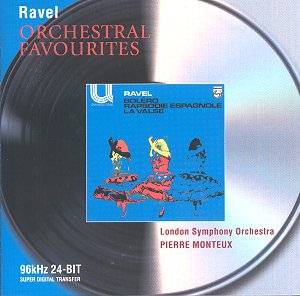RAVEL (1875-1937)
Ma Mère l'Oye (complete ballet) (1911)
La Valse (1919)
Pavane pour une Infante défunte
(1910)
Rapsodie Espagnole (1910)
Boléro
(1928)
 London SO/Pierre Monteux
London SO/Pierre Monteux
rec Dec 1961 Kingsway Hall, London; Feb 1964, Wembley Town Hall, London
ADD
 PHILIPS 464 733-2
[77.13]
PHILIPS 464 733-2
[77.13]
Crotchet
AmazonUK
AmazonUS
Amazon
recommendations

This is another palpable hit in the otherwise splashily selected Philips
Fifty series. Thank heavens Philips have left behind the old pattern of exactly
replicating contents of the original LPs into the CDs. Here, not only do
we have the pieces on the old 1972 Universo LP but also the Pavane
and complete ballet from the Decca collection. This is one of the joys of
the Universal conglomerate - that it can create generous compilations.
Interesting though that Decca recordings are to be used in the Philips Fifty
collection. Small incongruities are irrelevant in the face of such a harvest.
I used to have that Universo LP in my collection. Its cheaply designed but
memorable sleeve cover appears on the front of the CD booklet. Oddly enough
apart from being included in a Philips 5CD Monteux retrospective (issued
in the 1980s) that Universo collection (later reissued on a Sequenza LP)
never made it to silver disc. Contrast the Decca collection (Pavane and ballet)
which was reissued several times over by Decca in various mid-price series.
The credentials of Pierre Monteux (1875-1964) in this repertoire were well
nigh impeccable. He was the chosen conductor of Diaghilev for the Ballets
Russes and conducted the premieres of Daphnis, Petrushka and
The Rite of Spring. He served with the French Army in 1913 and 1914
seeing action at Verdun. He was released from service to go to the USA to
help with the propaganda effort and was appointed Music Director of the Boston
Symphony 1919-24. He was permanent conductor of the San Francisco Symphony
from 1935 to 1952.
His lack of pretension and flamboyance endeared him to many. He usually conducted
without a score and was undemonstrative in his movements. He admitted that
those pieces which he was called on to conduct time after time (like the
Ravel and Debussy) began to lose their interest to him. Fortunately this
does not show despite the fact that these recordings were made when Monteux
was 86 and 89. He was not the young 'brand' of the 1910s and 1920s. This
makes the vibrancy of his interpretations all the more wondrous even if the
impression left is of a languid tendency.
From the softest of feathery fanfares in the Prélude to the
fruity sharp Danse du rouet to the almost-touch sleepy signature of
the Pavane, to the nostalgie of Petit Poucet, to the water-carrier
silky chinoiserie of Laideronnette, to the symphonic summation in
bell-swung tenderness of Le Jardin féerique Monteux handles
this mayfly wing creation with coaxing tenderness. Hearing that apotheosis
prompts thoughts of Frank Bridge's Enter Spring and John Foulds'
April-England.
There are many joys to be garnered. These include the nicely defined
flutter-tongued flute of the opening bars of La Valse (later to be
used by Louis Aubert in his no less striking marine-fantasy Le Tombeau
de Chateaubriand) to the ppp bass chord at 1.40 in the beautifully
rendered Pavane. In the Rapsodie there is a palpable deliberation
in the Malagueña and Habanera and when did the cow-bells
register as clearly (and subtly) in Habanera as at 1.12. In the Feria
Monteux creates time and space for details to register - e.g. the harp
runs and dreamy baritonal glissandi at 4.02. I suspect the engineers pulled
back on the controls for that bass drum thwack at the end. A pity because
its etiolated impact somewhat saps the climactic last page.
Spatial illusion is, in general, well caught including a nicely distanced
pattering side-drum in Boléro. A trace of hardness has entered
the soul of the violins and there is a low level of hiss declaring the iron
oxide origins of the tapes. Nothing to discourage unduly.
This is a desirable collection (complemented by Max Harrison's distinguished
notes) for those liking their Ravel lovingly done with understatement and
with colour. These pieces were old friends to Monteux and he bids them farewell
in sessions dating from the year of his death and four years before that.
Rob Barnett

